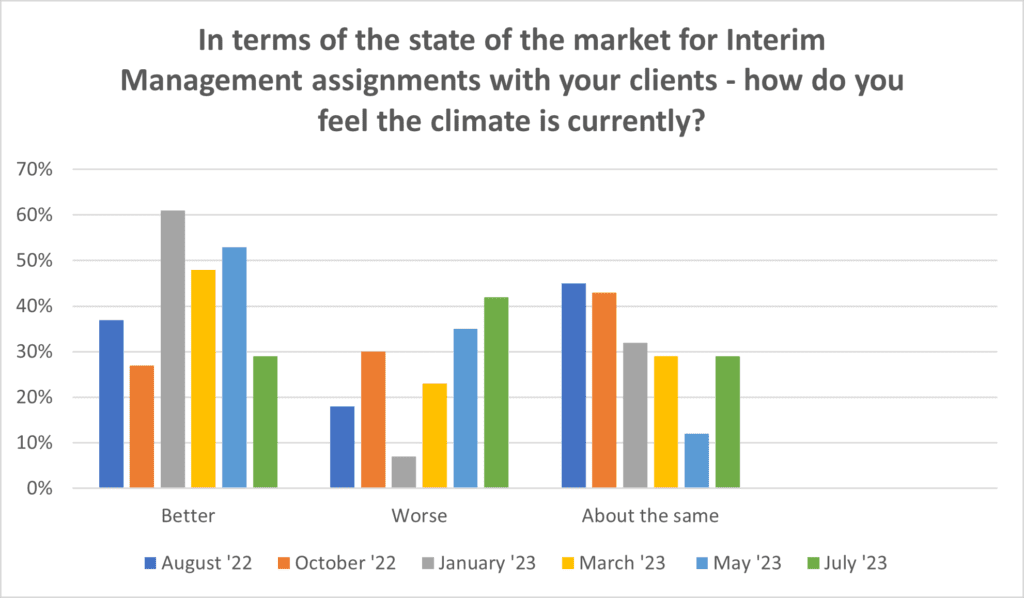Interim Management Snapshot Survey – The current climate
Russam’s Managing Director, Jason Atkinson, has been diligently sending out surveys to a pool of interim managers, to gather information on the mood, activity, and emerging patterns in the market, and with a year of statistics gathered, he makes some observations.
Firstly, I’d like to extend a massive ‘thank you’ to the almost 600 Interim Management executives who have taken the time to complete each of our bi-monthly snapshot surveys over the past year. We now have a full year of statistics and there are two main observations that I would pull out:
- It is tough out there. The current figures remind me a little of the British weather this summer.
- There is a negative correlation between the statistics and evidence we have for actual interim placements and client behaviour.

The July 2023 survey showed a negative swing in terms of a worsening climate for interim management projects. This statistic increased from 35% to 42% over the two-month survey period, and at 42% “worse” this is the highest figure in the 12-month survey (the figure was 18% in August 2022). It is hard to spin this, but at least c.60% feel the market is better or about the same as we enter the busiest (historically) time of our year and the Autumn window.
Speaking to our clients we hear that “interim” is popular and high on their list of options to resource up and get things done. This is reflected in the new roles that we are logging on our CRM system and currently working on, especially across finance, technology, and project management. The key reasons for hiring an interim manager remain:
- Availability – Interim managers are often available immediately, whereas typically it could take a minimum of four months to hire a permanent employee serving a notice period.
- Immediate results – Unlike a permanent employee who is typically given time to settle in, the interim manager will start delivering results immediately, identifying quick wins and building relationships rapidly. They “hit the ground running” with no more than a five-day honeymoon period.
- Flexibility – “Try before you buy” – Many interim managers end up on the payroll, though this would not have been the original aim. An assignment enables both parties to try each other out before committing to a permanent relationship. It could avoid a costly mistake on the wrong individual.
- Interim managers are cost-effective – Compared to the permanent C-level individuals of an organisation, interim managers are cost-effective. Interims are only getting paid for the days that they work. Here, all the invoices are based on the fee per day spent working on the assignment, and performance is tightly measured.
- Experience – Interim managers offer instant experience and capability almost always one level above the job requirements. They know what best practice looks like and may even have had a recent assignment at a competitive organisation. They can provide much needed stability during difficult times.
- Interim managers have great project management skills – They can get on with implementing things: Strategy, relocation of a company’s factory, a start-up project, closing down of a branch or division, downsizing or restructuring.
One of my clients, who was formerly HRD for the construction firm Balfour Beatty, provided a nice summary of the power of interim managers during a recent podcast:
“As organisations move through various transformations in today’s difficult economy, the flexibility and expertise offered by interim managers is invaluable. These are fluid times and a fluid approach to resourcing strategies is vital if organisations are to remain competitive. Highly skilled interims offer precisely that support.”

Contact us
Call us on 07930 356305 or email HQ@russam.co.uk








